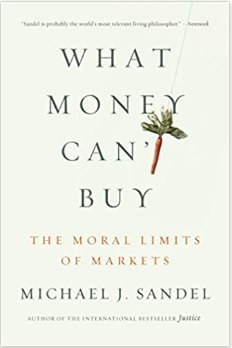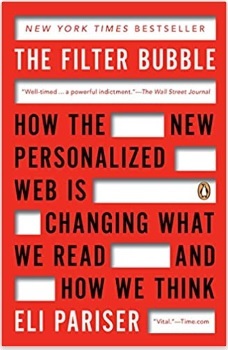Last updated on July 19th, 2022 at 02:42 pm
I’m reading two books at the same time right now, and although they seem to be about different topics, they have an interesting intersection.
Let’s call it The Money Culture, where everything is a commodity and every commodity has its price. It’s making me think that I should balance my dream of financial mastery with a dream of valuing some things in ways other than dollars and sense.
Book #1 is called The Filter Bubble: How the Personalized Web is Changing What We Read and How We Think, by Eli Pariser.
I know. The title does sound vaguely paranoid, doesn’t it? After all, the Internet is something most of us take for granted. What did we ever do without it?
How did we find out, at midnight on a Sunday, who Queen Elizabeth I appointed governor of the lost Roanoke Colony?
How did we figure out, without paying the $35 co-pay and waiting a week for the next available appointment with the pediatrician, that the bump on our son’s foot was a garden-variety wart and not a metastasizing mole?
How the heck did we get to laugh all over again at Tim Conway’s elephant sketch from the old Carol Burnett show?
It’s no news flash that Google is tracking us.
When we search online for a cheap garage door, Google serves us up garage door ads everywhere we go in the virtual world. That part I’m used to.
Here’s the part I hadn’t been thinking about. It’s not just the ads that follow us around. Google’s assumptions about us, based on our internet activity, are also used to filter our searches. If we got ten people together and had them all search an identical term, each from her own computer, we’d get ten different result pools. That’s because Google makes assumptions based on our habits and history, and it feeds us what it thinks we most want to know.
This is the internet version of having your very own yes-man. Just tell me what you think I want to hear, never mind the truth.
Mind you, I’m not convinced – yet – that Google is doing this for evil. I think Google thinks it’s helping us. There is so much information out there, we can’t possibly take it all in. But we don’t have to! We can just focus on the part we care about. It’s kind of a customer service thing, I guess.
Except no good can come of it.
Book #2 is called What Money Can’t Buy: The Moral Limits of Markets. It’s by Michael Sandel.
The concept behind this book is that somehow we have moved from a market economy to a market society. That means almost everything can be bought. Hence, as a society, we value things in dollars and cents – even things that shouldn’t be about dollars and cents. And the scary part is, that this shift has happened so quietly that most of us don’t even realize it. It’s “normal” to us that we can buy anything we can think of.
Let me give you a personal example of this concept. I recently had a conversation with a mother who was crowing about the fact that her four-year-old child could read but bemoaning the fact that he didn’t like it. I asked why she thought that was, and she said she didn’t know. She allowed as how she had tried everything to get him to like it. Such as? Well, for one thing, she takes him to the library every day and bribes him to finish a book. Not to read it, but to finish it, “…so we can get on to the next one.”
She’ll give him a dollar, or take him out for ice cream, or promise a toy. Anything to get him to focus long enough to read all the way through the book so that tomorrow he can read another one. All while standing in a library, where there are endless numbers of books. The poor kid must feel like he’ll never get to the end.
I don’t know about you guys, but when I read a book, I don’t generally read it to get to the end so I can go on to the next one. I read it because I want to know what’s in it, because I love reading, and because a good book is my favorite escape. This poor mother has managed to commoditize her son’s reading. The goal is for him to chew through books like a goat chewing through the back 40–the faster the better. And she wonders why he doesn’t like it.
Sandel has plenty of examples of things that can now be bought that never used to be part of the commercial stream. You can buy your way into a prestigious private university if your parents have lots of money and are likely to be big donors. You can buy a third-world surrogate mother for one-third the cost you’d pay in the US. You can buy an election. Well, that one’s been true throughout history, but it used to be shameful and scandalous, something you hid. Now the Supreme Court basically says it’s okay.
Now here’s the intersection between these two books.
The reason Google is tracking us is to turn us into full-time consumers. Our every interest has become a way to sell us something. And not only does that commoditize our very thoughts, but it has the nasty spin-off of keeping us ignorant of objective truth.
Our primary source of information is biased toward what we already think we know.
Thus, in the quest for more perfect marketing schemes, the Internet has become the ultimate fun house mirror, where the more we look, the more we see nothing but our own reflection, reflecting itself to infinity and beyond.
Jayne Speich
Jayne Speich is co-founder of Business Growth Advocate dedicated to the survival and growth of small businesses in the new era.
 |  |

Enjoy this special 8WomenDream Guest Contributor story submitted by new and experienced big dreamers throughout the world, edited and published to capture a dream perspective from different points of view. Do you have a personal dream story to share with 8WomenDream readers? Click here to learn how to submit dream big articles for consideration.
Note: Articles by Guest Post Contributors may contain affiliate links and may be compensated if you make a purchase after clicking on an affiliate link.



